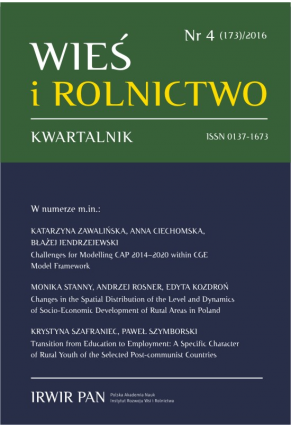The Social Process of Defining Quality Food, Based on the Opinions of Polish Consumer Cooperative Members
DOI:
https://doi.org/10.53098/wir.2016.4.173/07Keywords:
food quality, alternative food networks, cooperativesAbstract
This article describes how members of consumer cooperatives define quality food. Cooperatives are seen as one of the forms of Alternative Food Networks. The concept of quality food is defined subjectively. The analysis presented in the paper is based on the results of a questionnaire conducted in winter 2015/2016 among members of consumer cooperatives in Poland. The spontaneously made three main associations with the notion of “high quality food” indicate that customers consider qualities that are the result of the ways and methods of production. Food quality and safety are the results of individual and organisational trust and mutual relations, among consumers themselves as well as between consumers and producers. In the case of mass-produced food, issues of safety have become crucial: for the indicated group food safety means shifting from the rules of the “industrial world” to the rules of the “domestic world” where safety is the result of trust, direct consumer/supplier relations, and/or traditions rather than standardised norms.References
Barbera F., Audifredi S. (2012). In pursuit of quality. The institutional change of wine production market in Piedmont. Sociologia Ruralis, 52 (3), 311–331.
Buechler S. (2008). Teorie nowych ruchów społecznych. In: K. Gorlach, P. Mooney (eds.), Dynamika życia społecznego. Współczesne koncepcje ruchów społecznych (pp. 161–187). Warsaw: Wydawnictwo Naukowe Scholar.
Bilewicz A., Śpiewak R. (2015). Enclaves of activism and taste: Consumer cooperatives in Poland as alternative food networks. SOCIO.HU, 3, 145–166.
Bilewicz A., Potkańska D. (2014). Jak kiełkuje społeczeństwo obywatelskie. Kooperatywy spożywcze w Polsce jako przykład nieformalnego ruchu społecznego. Kwartalnik Trzeci Sektor, 31, 25–44.
Callon M., Meadel C., Rabeharisoa V. (2002). The economy of qualities. Economy and the society, 31 (2), 194–217.
Cardello A. (1995). Food quality: Relativity, context and consumer expectations. Food quality and preference, 6, 163–170.
CBOS 115/2014. Zachowania żywieniowe Polaków; http://www.cbos.pl/SPISKOM.POL/2014/ K_115_14.PDF [accessed: 17.08.2016].
CBOS 18/2016. Zaufanie społeczne; http://www.cbos.pl/SPISKOM.POL/2016/K_018_16.PDF [accessed: 1.12.2016].
Cyran K. (2014). Cena jako wyznacznik jakości produktów żywnościowych. Modern Managmnet Review, 19, 47–59
Domański H., Karpiński Z., Przybysz D., Straczuk J. (2015). Wzory jedzenia a struktura społeczna. Warsaw: Wydawnictwo Naukowe Scholar.
Fonte M. (2013). Food consumption as social practice: Solidarity Purchasing Groups in Rome Italy. Journal of Rural Studies, 32, 230–239.
Goodman D. (2004). Rural Europe redux? Reflection on Alternative Agro-Food Networks and Paradigm Change. Sociologia Ruralis, 44 (1), 3–16.
Gronow J., Warde A. (2001). Ordinary Consumption. London: Routledge.
Goszczyński W. (2014). Smak zmiany. Nowe formy społecznej organizacji rolnictwa i konsumpcji żywności w Unii Europejskiej. Warsaw: Wydawnictwo Naukowe Scholar.
Goszczyński W. (2015). Jeść i być: od innowacji społecznych do podmiotowego modelu konsumpcji na rynku żywności. Marketing i Rynek, 2, 220–230.
GUS (2015). Obwieszczenie w sprawie przeciętnego miesięcznego dochodu rozporządzalnego na 1 osobę ogółem w 2014 roku; http://stat.gov.pl/sygnalne/komunikaty-i-obwieszczenia/lista-komunikatow-i-obwieszczen/obwieszczenie-w-sprawie-przecietnego-miesiecznego-dochodu-rozporzadzalnego-na-1-osobe-ogolem-w-2014-r-,294,1.html [accessed: 1.12.2016].
Harvey M., McMeekin A., Warde A. (2004). Conclusion: quality and process of qualification. In: M. Harvey, A. McMeekin, A. Warde (eds), Qualities of food (pp. 192–209). Manchester: Manchester University Press.
Ilbery B., Moya K. (2000). Registering regional speciality food and drink products in the United Kingdom: the case of PDOs and PGls. Area, 32.2, 317–325.
Jaklin U., Kummer S., Milestad R. (2015). Why do farmers collaborate with a Food Cooperative? Reasons for participations in a Civic Food Network in Vienna, Austria. International Journal of Sociology of Agriculture and Food, 22, 41–60.
Jabłońska B. (2013). Krytyczna analiza dyskursu w świetle założeń socjologii fenomenologicznej. Przegląd Socjologii Jakościowej, 9 (1), 48–61.
Jarosz L. (2008). The city in the country: growing alternative food networks in metropolitan areas. Journal of Rural Studies, 24, 231–244.
Kwasek M. (2011). Jakość i bezpieczeństwo żywności. In: M. Kwasek (ed.), Jakość i bezpieczeństwo żywności a zdrowie konsumenta. Z badań nad rolnictwem społecznie zrównoważonym. Warsaw: Instytut Ekonomiki Rolnictwa i Gospodarki Żywnościowej PIB.
Leszczyńska M., Pogoda I., Szostakowska M., Ulanicka M. (2015). Raport: kogo nęci zdrowe jedzenie. Ośrodek Ewaluacji. https://ewaluacja.eu/wp-content/themes/release/img/Raport_Kogo_neci_zdrowe_jedzenie.pdf [accessed: 02.12.2016].
Marsden T. (2004). Theorising food quality: some key issues in understanding its competitive production and regulation. In: M. Harvey, A. McMeekin, A. Warde (eds), Qualities of food (pp. 192–209). Manchester: Manchester University Press.
Murdoch J., Miele M. (2004). A new aesthetic of food? Relational reflexivity in the “alternative” food movement. In: M. Harvey, A. McMeekin, A. Warde (eds), Qualities of food (pp. 156–175). Manchester: Manchester University Press.
Peri C. (2006). The universe of food quality. Food Quality and Preference, 17, 3–8.
Restakis J. (2010). Humanizing the Economy. Cooperatives in the Age of Capital. Gabriola BC: New Society Publishers.
Reeves C., Bednar D. (1994). Defining quality: alternatives and implications. Academy of Management Review, 19 (3), 419–445.
Sage C. (2003). Quality in alternative food networks: conventions, regulations and governance. Paper presented at the International Seminar ‘Policies, Governance and Innovation for Rural Areas’, 21–23 November, Università della Calabria, Arcavacata di Rende.
Sonnino R., Mardsen T. (2006). Beyond the divide: rethinking relationships between conventional and alternative food networks in Europe. Journal of Economic Geography, 6, 181–199.
Sassatelli R. (2004). The political morality of food: discourses, contestation and alternative consumption. In: M. Harvey, A. McMeekin, A. Warde (eds), Qualities of food (pp. 176–191). Manchester: Manchester University Press.
TNS OBOP (2011). Rozpoznawalność marki “Poznaj Dobrą Żywność”; https://www.minrol.gov.pl/content/download/35399/…/1/…/Raport_15.12.2011.pdf [accessed: 2.03.2016].
Vieta M. (2010). The New Cooperativism (Editorial). A Journal of Radical Theory Culture and Action, 4 (1), 1–11.
Yu Wang R., Si Z., Ng N.C., Scott S. (2015). The transformation of trust in China’s alternative food networks: disruption, reconstruction, and development. Ecology and Society, 20 (2).
Downloads
Article file downloads
Pages
How to Cite
Issue
Section
License
Copyright (c) 2016 Wieś i Rolnictwo

This work is licensed under a Creative Commons Attribution 4.0 International License.






